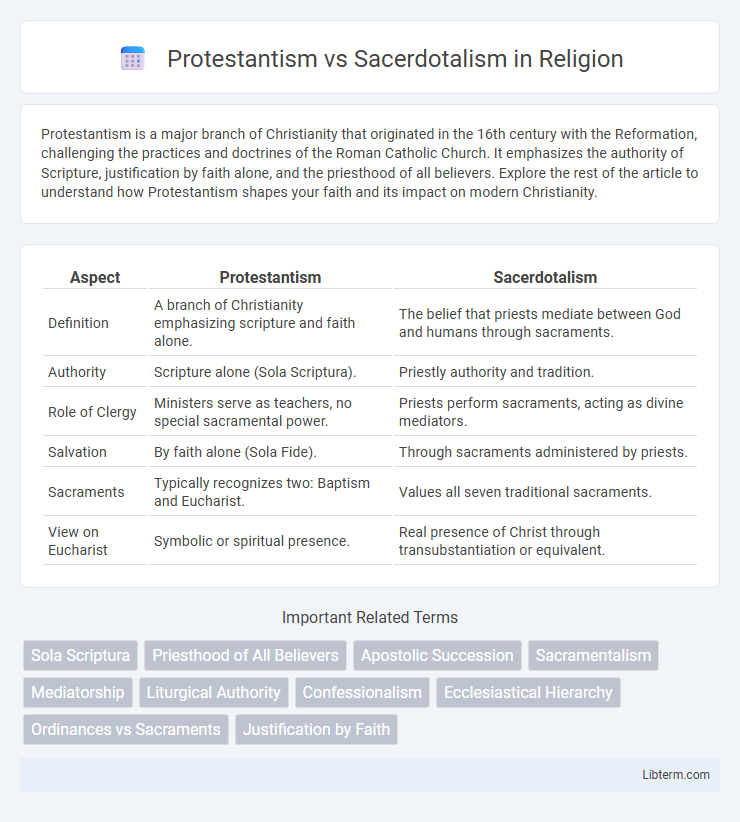Protestantism is a major branch of Christianity that originated in the 16th century with the Reformation, challenging the practices and doctrines of the Roman Catholic Church. It emphasizes the authority of Scripture, justification by faith alone, and the priesthood of all believers. Explore the rest of the article to understand how Protestantism shapes your faith and its impact on modern Christianity.
Table of Comparison
| Aspect | Protestantism | Sacerdotalism |
|---|---|---|
| Definition | A branch of Christianity emphasizing scripture and faith alone. | The belief that priests mediate between God and humans through sacraments. |
| Authority | Scripture alone (Sola Scriptura). | Priestly authority and tradition. |
| Role of Clergy | Ministers serve as teachers, no special sacramental power. | Priests perform sacraments, acting as divine mediators. |
| Salvation | By faith alone (Sola Fide). | Through sacraments administered by priests. |
| Sacraments | Typically recognizes two: Baptism and Eucharist. | Values all seven traditional sacraments. |
| View on Eucharist | Symbolic or spiritual presence. | Real presence of Christ through transubstantiation or equivalent. |
Introduction: Defining Protestantism and Sacerdotalism
Protestantism is a branch of Christianity emphasizing scripture authority, justification by faith, and the priesthood of all believers, rejecting the necessity of mediating priests. Sacerdotalism centers on the belief that priests serve as essential intermediaries between God and humans through sacramental rites. These contrasting theological frameworks shape differing views on salvation, church authority, and religious practice.
Historical Background and Origins
Protestantism emerged in the early 16th century as a reform movement against the Roman Catholic Church's sacerdotal system, emphasizing direct access to God through faith rather than clerical mediation. Rooted in Martin Luther's 1517 challenge to papal authority, Protestantism rejected the sacramental priesthood and sacral hierarchy characteristic of sacerdotalism. The contrasting doctrines highlight divergent views on clergy's role, with sacerdotalism affirming priests as essential mediators of divine grace, a concept firmly established in medieval Catholic tradition.
Core Theological Differences
Protestantism emphasizes justification by faith alone and the priesthood of all believers, rejecting the necessity of a mediating priestly class. Sacerdotalism upholds the essential role of ordained priests as mediators between God and humans, asserting the authority of sacraments administered exclusively by clergy. This core theological difference centers on the interpretation of salvation, ecclesiastical authority, and the function of sacraments within Christian practice.
Authority of Scripture vs. Authority of Priesthood
Protestantism upholds the authority of Scripture alone (Sola Scriptura) as the ultimate guide for faith and practice, emphasizing direct access to the Bible without mediating priests. Sacerdotalism, dominant in Catholic and Orthodox traditions, asserts the authority of the priesthood to interpret and administer the sacraments, positioning clergy as essential mediators between God and believers. This fundamental divergence shapes each tradition's theology, liturgy, and ecclesiastical structure.
The Role of Clergy and Laity
Protestantism emphasizes the priesthood of all believers, advocating equal access to God without a distinct clerical hierarchy, thereby empowering laity in worship and church governance. In contrast, Sacerdotalism upholds a distinct and authoritative clergy ordained to mediate between God and laity, emphasizing sacramental roles such as confession and Eucharistic consecration. This fundamental difference shapes the respective ecclesiologies, worship practices, and theological understandings of spiritual authority and mediation.
Views on Sacraments and Rituals
Protestantism generally emphasizes faith and scripture over sacraments, viewing them as symbolic acts rather than means of grace, with common recognition of two sacraments: baptism and the Lord's Supper. Sacerdotalism upholds the authority of priests and the efficacy of sacraments as channels of divine grace, often recognizing seven sacraments including the Eucharist, confession, and ordination. Rituals in sacerdotal traditions are considered essential for spiritual transformation, whereas Protestant practices prioritize personal belief and direct access to God.
Salvation: Faith Alone vs. Mediated Grace
Protestantism emphasizes salvation through faith alone (sola fide), asserting that individuals receive grace directly from God without the need for mediation by clergy. In contrast, Sacerdotalism teaches that salvation is attained through the sacraments administered by priests, who act as necessary mediators of divine grace. This fundamental theological divergence shapes contrasting views on the role of faith, clergy, and ritual in the process of salvation.
Worship Practices and Liturgical Distinctions
Protestantism typically emphasizes congregational worship with a focus on preaching, Scripture reading, and singing, often characterized by simpler liturgical forms. Sacerdotalism, prominent in Catholic and Orthodox traditions, centers on the sacerdotal role of the priest, emphasizing sacramental rites, the Eucharist, and ritualistic ceremonies as essential components of worship. Liturgical distinctions include the use of vestments, incense, and elaborate ritual actions in sacerdotal traditions, contrasting with the more austere and word-centered services commonly found in Protestant denominations.
Influence on Modern Christianity
Protestantism significantly shaped modern Christianity by emphasizing personal faith, scripture authority, and direct access to God, which fostered diverse denominations and encouraged individual interpretation of the Bible. Sacerdotalism, centered on priestly mediation and sacramental authority, maintains strong influence in traditions such as Roman Catholicism and Eastern Orthodoxy, preserving liturgical continuity and hierarchical structures. The ongoing dialogue between these perspectives continues to impact theological debates, worship practices, and ecclesiastical governance in contemporary Christian communities.
Ongoing Debates and Contemporary Perspectives
Protestantism challenges sacerdotalism by emphasizing direct access to God through faith, rejecting the necessity of priestly mediation for salvation and sacraments. Contemporary debates focus on the role of clergy authority and sacramental theology, with some Protestant denominations adopting a more flexible approach to liturgical practices traditionally reserved for sacerdotal systems. These ongoing discussions highlight the evolving understanding of ecclesiastical hierarchy, spiritual authority, and the individual believer's relationship with the divine in modern Christianity.
Protestantism Infographic

 libterm.com
libterm.com